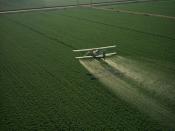What is organic and conventional farming and which is superior? This is a question commonly asked by those who are unaware of the positive and negative outcomes of either one. Organic farming is a form of agriculture which avoids or largely excludes the use of synthetic fertilizers and pesticides, (any substance or mixture of substances intended for preventing, destroying, repelling, or mitigating any pest), plant growth regulators, and livestock feed additives, such as hormones. On the other hand, conventional agriculture is a chemical process in which fertilizers are used to increase crop yields, also known as agricultural output, the use of pesticides to protect crops, and the use of antibiotics and hormones to increase productive efficiency of livestock.
Organic farming refers to agricultural production systems used to produce food and fiber. Organic farming management relies on developing biological diversity in the field and the maintenance and replenishment of soil fertility.
Organic farmers are not allowed to use synthetic pesticides or fertilizers. All kinds of agricultural goods are produced organically, including produce, grains, meat, dairy, eggs, and fibers such as cotton, flowers, and processed food products. As far as possible, organic farmers rely on crop rotation-the practice of growing a series of dissimilar type of crops in the same space in sequential seasons to avoid the buildup of pathogens and pests that often occur when one species is continuously cropped. As well as crop residues, animal manures and mechanical cultivation is used to maintain soil productivity and tilth, the agricultural preparation of the soil by digging it up, to supply plant nutrients, and to control weeds, insects and other pests. Organic agriculture is a far more complicated process and requires much attention as opposed to conventional farming.
Conventional farming refers to growers using methods that are, unfortunately, the most well-known to...


